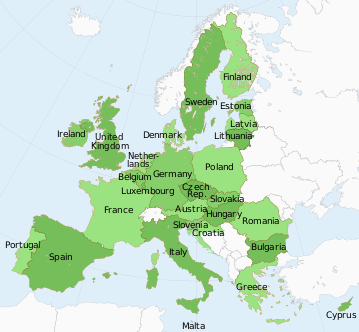Economic Relations between India and European, Oceania Countries | 30 Mar 2019
- Recently, interaction on trade and economic cooperation with ambassadors and high commissioners of European and Oceania countries took place in New Delhi.
Background
- European and Oceania countries are major trading partners and major sources of investments for India and there is the huge untapped potential that can be achieved.
- During 2017-18, India’s trade with Europe stood at USD 130.1 billion, with both exports and imports registering double-digit growth.
- In Oceania, India is the fifth largest export market for Australia, with coal, education-related travel, vegetable, and gold being some of the major items of imports by India.
- Major exports from India to Australia include refined petroleum, business services, and pharmaceuticals.
- New Zealand is also an important market for India in the Oceania region, especially for its exports of pharmaceuticals, gems, and jewelry, machinery and textiles, and apparel.
- Nearly, more than USD 1.2 billion was invested by companies from Oceania in the Indian market from April 2000 to December 2018.

- The Oceania region also accounts for nearly 1.7 percent of India’s overseas FDI, with Australia, Fiji, New Zealand, and Vanuatu being the key investment destinations.
India-Europe Union Economic Relations
- The EU as a
bloc of 28 countries is India’s largest regional trading partner while India was the EU’s 9th largest trading partner in 2015. - India and the EU are in the process of negotiating a bilateral Broad-based Trade and Investment Agreement (BTIA) since 2007.
European Union
- European Union (EU), is an international organization comprising 28 European countries and governing common economic, social, and security policies.
- The EU was created by the Maastricht Treaty, which entered into force on November 1, 1993.
- The treaty was designed to enhance European political and economic integration by creating a single currency (the euro), a unified foreign and security policy, and common citizenship rights and by advancing cooperation in the areas of immigration, asylum, and judicial affairs.
Issues in India-EU Trade Relations
- Even after 13 rounds of negotiations, BTIA has not led to the signing of the agreement.
- Intellectual property rights: There is disagreement over IP protection standards. The EU is keen that India should adopt stringent IP protection standards.
- For India, such a step could impact public health and seriously affect the Indian pharmaceutical sector.
- Reduction in tariffs: One of the major demands of the EU is that India should lower its tariff rates on European dairy and poultry products, wines and spirits.
- Reduction of tariffs in the dairy sector and poultry industry could have a serious impact on the Indian dairy industry, mainly on employment.
- Services sector: India has demanded flexible regulations, greater access for Indian services and an easy visa requirement for Indian professionals. Europe is cautious about allowing this fearing an increased unemployment problem.
India-Oceania Relations
- India’s trade relation with Oceania has been dominated by Australia and New Zealand.
- India’s trade in goods and services with Australia was approximately US$ 15.6 billion in 2016.
- India was New Zealand’s 11th largest bilateral trading partner (2017) with total trade in both goods and services valued at US$ 1.91b.
- Apart from these two India also has a significant trade relationship with the Pacific island nations with Fiji and Papua New Guinea dominating the relations. India’s trade with the Pacific Islands stood at US$ 228 million in 2012.
Pacific Island Forum (PIF)
- The PIF was formed in 1999 as a successor to the earlier South Pacific Forum set up in 1971.
- Regional cooperation has grown steadily under the aegis of the PIF.
- India is a dialogue partner of the Pacific Island Forum (PIF).
Forum for India–Pacific Islands Cooperation (FIPIC)
- Forum for India–Pacific Islands Cooperation (FIPIC) was launched during the visit of Prime Minister of India to Fiji in November 2014.
- Member Countries - India and 14 Pacific Island countries, namely Fiji, Cook Islands, Kiribati, Marshall Islands, Micronesia, Nauru, Niue, Palau, Papua New Guinea, Samoa, Solomon Islands, Tonga, Tuvalu, and Vanuatu.
Issues between India and Pacific Island Countries (PICs) Trade Relations
- The low volumes of trade between India and the PICs are due to the small populations and market sizes in these islands, as well as their distance from India.
- Steps Taken by India to Improve Trade Relations
- India has established Trade Office for Pacific Island Forum countries in India.
- The FIPIC Trade Office in New Delhi will support the development of micro, small and medium Enterprises. The Office will assist in improving Market Access for the Pacific Islands.
